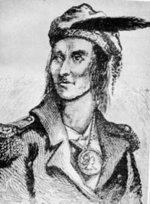Battle of the Thames
|
|
| Battle of the Thames | |||||||||||||||||||
|---|---|---|---|---|---|---|---|---|---|---|---|---|---|---|---|---|---|---|---|
| Conflict | War of 1812 | ||||||||||||||||||
| Date | October 5, 1813 | ||||||||||||||||||
| Place | Near Chatham, Ontario | ||||||||||||||||||
| Result | American victory | ||||||||||||||||||
| |||||||||||||||||||
The Battle of the Thames, also known as the Battle of Moraviantown, was a decisive American victory in the War of 1812 which took place on October 5, 1813.
| Contents |
Background
In September, 1813 the American navy under Oliver Hazard Perry scored a decisive victory in the Battle of Lake Erie. British General Henry Proctor, feared losing his supply lines and, against the advice of his ally Tecumseh, was retreating from Fort Malden. American General William Henry Harrison trailed Proctor through Ontario. Tecumseh had pleaded with Proctor to stop and face Harrison several times. Finally Proctor was convinced to face Harrison at Moraviantown on the Thames River.
Forces
Harrison's force totaled at least 3,500 infantry and cavalry. Colonel Richard Mentor Johnson commanded the Kentucky cavalry; five brigades of Kentucky militia were led by the sixty-three year-old governor of Kentucky, an American Revolutionary War veteran named Isaac Shelby. Many of the volunteers under Johnson were from the River Raisin area and enlisted with the slogan "Remember the Raisin". Harrison's army was eager for a fight. Proctor on the other hand had about 800 soldiers along with about 500 natives led by Tecumseh. The British soldiers were becoming increasingly demoralized and Tecumseh's warriors grew even more impatient with Proctor for his unwillingness to stop and fight. Proctor even feared a mutiny by the warriors.
The Battle
William_H._Harrison.jpg
Results
The Battle of the Thames was a decisive victory for the Americans that led to the re-establishment of American control over the Northwest frontier for the remainder of the war. Harrison's popularity grew and was eventually elected president of the United States. Proctor was later court-martialed for cowardice and removed from command. The death of Tecumseh was a crushing blow to the Indian alliance he had created and it effectively dissolved following the battle.
Notes
- Note 1: Strength numbers and composition from John Sugden, Tecumseh: A Life (New York: Holt, 1997), pp. 368-72; casualty figures from John R. Elting Amateurs, To Arms! A Military History of the War of 1812 (Chapel Hill, NC: Algonquin, 1991;Da Capo reprint, 1995) p. 113.

